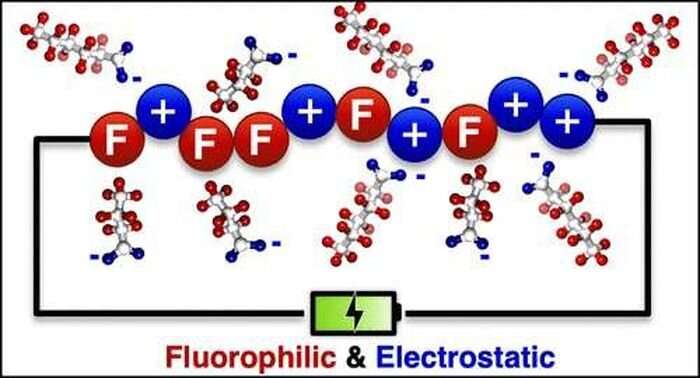This article has been reviewed according to Science X's editorial process and policies. Editors have highlighted the following attributes while ensuring the content's credibility:
fact-checked
peer-reviewed publication
trusted source
proofread
Advanced electrode to help remediation of stubborn new 'forever chemicals'

As new environmental regulations are rolling out to mitigate the industry-retired long-chain chemicals known as PFAS in drinking water, there are concerns regarding a new breed of "forever chemicals" called short-chain PFAS. Research from the University of Illinois Urbana-Champaign is helping shift the focus to include mitigation of the chemicals—which researchers say are just as persistent as, more mobile and harder to remove from the environment than their long-chain counterparts.
A study directed by chemical and biomolecular engineering professor Xiao Su uses electrosorption rather than filters and solvents and combines synthesis, separations testing and computer simulations to help design an electrode that can attract and capture a range of short-chain PFAS from environmental waters. The findings are published in the Journal of the American Chemical Society.
"One of the challenges of working with short-chain PFAS is that they are not well-studied. We know that they contain fewer carbon and fluorine atoms, making them shorter molecules and, therefore, more mobile—or freer to interact within the natural environment," said Su, who collaborated with chemical and biomolecular engineering professor Diwakar Shukla. "Their electrostatic properties differ and they are more hydrophilic, meaning they are more apt to bond with water molecules. These properties combined make them more difficult to separate from water than their long-chained counterparts."
The differences among short- and long-chain PFAS—and between long-chain PFAS in general—are significant enough for Su's team to rethink its previously-developed electrode designed to attract, capture and destroy long-chain PFAS from the environment and drinking water sources. PFAS is an abbreviation for perfluoroalkyl and polyfluoroalkyl substances.
"One way to think of the behavior of short-chain PFAS is that they don't like to be around anything except their own kind," Su said. "So, to attract them, we need to sort of bait them with grafted fluorine groups—the "F' in PFAS—on the surface of an electrode."
Kinship is not the only challenge, though, Su said.
"The lengths of short-chain PFAS molecules vary, giving them different physical properties," Su said. "This means we need to be able to tune the electrode just right to attract and eventually release the short-chain PFAS, with molecular-level understanding of the interactions being key to success."
The study details the careful selection, matching and triangulating of different copolymer materials to develop an electrode that can attract a range of short-chain PFAS and induce an electric field to help release the molecules when needed.
Su said this work is a critical early step in removing short-chain PFAS from the environment, which have replaced long-chain PFAS in many industries.
"We still have much work to do," Su said. "Future studies will focus on coupling the electrodes developed in this study with electrochemical degradation methods to ensure removal of these persistent contaminants from the environment."
Illinois researchers Anaira Román Santiago, Jiho Lee and Johannes Elbert led the experimental investigations within the work, with graduate student Song Yin and Shukla leading the computational simulations.
More information: Anaira Román Santiago et al, Imparting Selective Fluorophilic Interactions in Redox Copolymers for the Electrochemically Mediated Capture of Short-Chain Perfluoroalkyl Substances, Journal of the American Chemical Society (2023). DOI: 10.1021/jacs.2c10963
Journal information: Journal of the American Chemical Society
Provided by University of Illinois at Urbana-Champaign




















